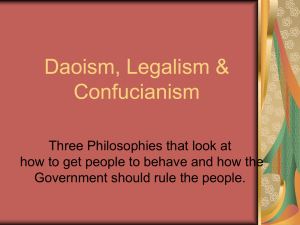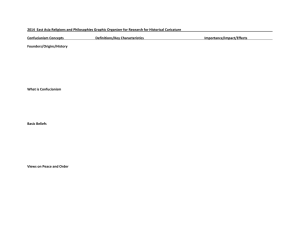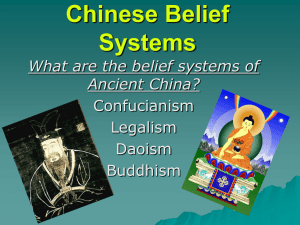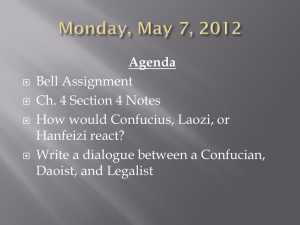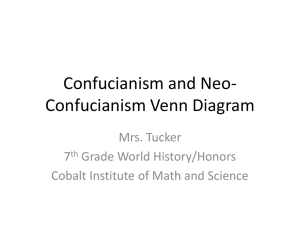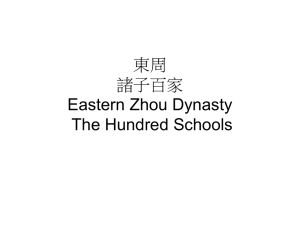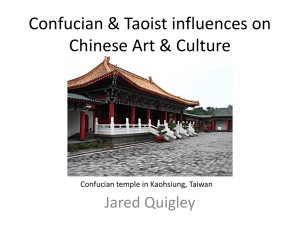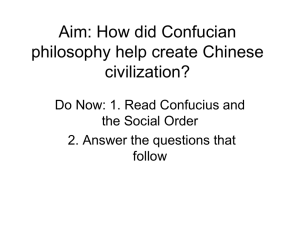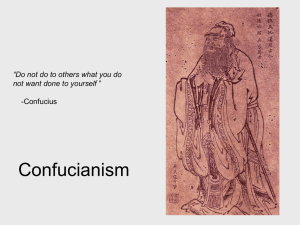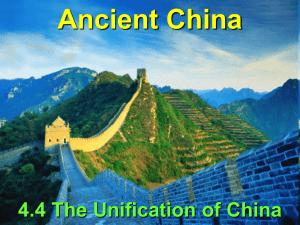Legalism and modern management
advertisement
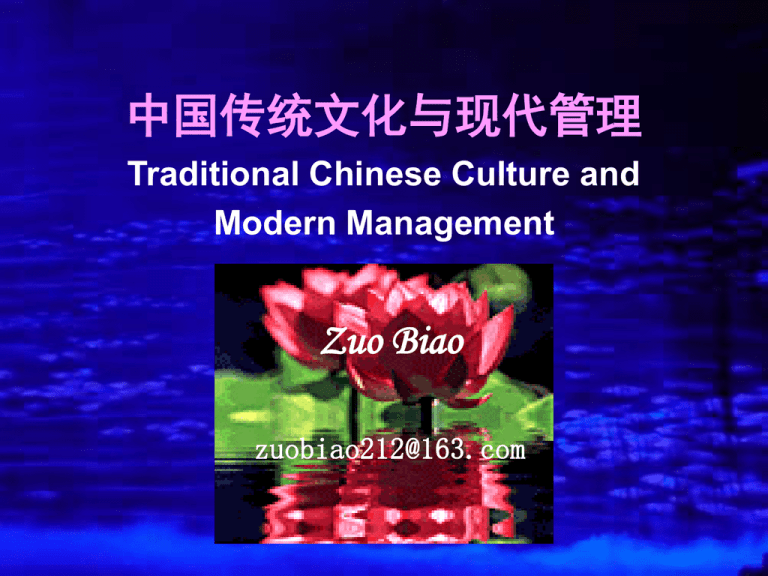
中国传统文化与现代管理 Traditional Chinese Culture and Modern Management Zuo Biao zuobiao212@163.com Friends From the SA Welcome to Shanghai Hello! Shanghai N. Carolina Florida Confucius said, “It’s such a great delight to have friends visiting from afar. 孔子说: “有朋自远方来,不亦乐乎!” 传统文化的三大支柱 The Three Pillars of Traditional Chinese Culture 儒家思想 Confucianism 法家思想 Legalism 道家思想 Taoism To solve the social problem of the 21st century, we have to rely on the teachings of Confucius, Mencius and Mahayana Buddhism. Toynbee & Ikeda : Choose Life: A dialogue, 2007 要解决21世纪的社会问题, 我们必须依仗孔子、孟子及大乘 佛教的教诲。 汤因比与伊克达 《选择人生:对话》,2007 儒家思想与现代管理 Confucianism and Modern Management 儒家思想的核心 The Core of Confucianism The core of Confucianism is humanism, the belief that human beings are teachable, improvable and perfectible through personal and communal endeavor. 儒家思想的核心是人本主义,相信通过自我 及团体的努力,人类是可教育、可提升、可完善 的。 儒家思想的核心 The Core of Confucianism Confucianism focuses on the cultivation of virtues and maintenance of morality so as to establish stable social order. 修身 Xīushēn 德 Dé 君子 Jūnzǐ Self-cultivation Self-improvement Virtue Morality Noble Man Gentleman The Supreme Pursuit of Confucians 内圣外王 nèi shèng wài wáng Literal translation: Internally a saint, externally a king. A noble heart, a benevolent ruler. Free translation: Only a man of noble character can exercise humane government. A successful administrator must, first of all, be a man of moral integrity. 内圣外王: The Supreme Pursuit of Confucians Confucius’ Statement: 子曰: “修己以安百姓。” “Cultivating one’s own moral character so that the people may live in peace and happiness. “Cultivating one’s own moral character with a view to governing the people successfully.” 内圣外王: The Supreme Pursuit of Confucians Statements by other scholars: “修身,齐家,治国,平天下。” 《礼记·大学》 Perfect self, put family affairs in order, administer the vassal state well and stabilize the whole country. Great Learning Major Confucian Concepts 儒学的主要概念 仁Rén Benevolence, Humaneness, Kindness, Love for fellow Beings, 子曰:“仁者爱人。 ” “Benevolence means loving others.” 子曰:“己所不欲,勿施于人。 ” "Do not do unto others what you would not have them do unto you." 子曰:“夫仁者,己欲立而立人,已欲达而达人。 ” “Benevolence means allowing others to establish themselves if you want to establish yourself and making others’ aim attainable if you want your own attainable." 礼Lǐ Rituals, Rites, Etiquette, Social Norms 子曰:“道之以政,齐之以刑,民 免而无耻;道之以德,齐之以礼, 有耻且格。 ” Govern the people with administrative rules and keep order with penal law, and they will merely avoid punishments but develop no sense of shame. Govern the people with moral force and keep order with rituals, and they will develop a sense of shame and modify their behavior. Other Concepts of Confucianism 智Zhì 子曰:“仁者不忧,智 者不惑,勇者不惧。” 《论语·宪问》 勇yǒng Wisdom, The benevolent is Bravery, Flexibility, free from anxiety, the Courage, Quick wise from puzzlement, Boldness, Understanding and the brave from fear. Fortitude Other Concepts of Confucianism 智Zhì Wisdom, Flexibility, 樊迟问智。子曰:“知人。”樊迟未 达。子曰:“举直错诸枉,能使枉者 直。” 《论语·颜渊第十二》 Wisdom means knowing how to judge people / to discover able and upright people. Being pressed by the straight, the crooked can be made straight. Other Concepts of Confucianism 子曰:“君子义以为 上。君子有勇而无义为 义yì 乱,小人有勇而无义为 盗。” Justice, Righteousness 勇yǒng 《论语·阳货》 Bravery, The gentleman Boldness prioritizes righteousness. A gentleman who is bold yet not righteous may cause trouble. A villain who is bold and not righteous may commit robbery. Other Concepts of Confucianism 生亦我所欲也,义亦我所欲也; 义yì 二者不可得兼,舍生而取义者也。 《孟子·告子上》 Justice, Righteousness, Both life and justice are precious to me. If I cannot have both, I prefer justice. Mencius Other Concepts of Confucianism 子曰:“君子和而不同,小人 和Hé Harmony Unity 同而不和。 《论语·子路第十三》 A true gentleman seeks harmony without uniformity. A petty man seeks uniformity without harmony. The Analects 孔子论政 Confucius’ Statements on Administration Confucius’ Statements on Administration “为政以德,譬如北辰,居其所而众星共之。 ” 《论语·为政第二》 “He who rules by moral force is like the pole-star, which remains in its place while all the lesser stars rotate around it. Analects “为政在人,取人以身,修身以道,修道以仁。” 《礼记·中庸》 Administration depends on people. People are judged by their moral character. Moral character must be guided to the right path. The right path is taken with benevolence. Doctrine of the Mean 孔子论政 Confucius’ Statements on Administration 为政以德 Virtue-oriented Administration 为政在人 People-based Administration Confucius’ Statements on Administration 子夏为莒父宰,问政。子曰:“无欲 速,无见小利。欲速则不达,见小利 则大事不成。 《论语· 子路第十三》 问政解答 Replies to questions about administration Do not hurry. Do not be complacent about minor achievements. Haste does not bring success. Satisfaction at minor achievements spoils the realization of important things. The Analects Confucius’ Statements on Administration 季康子问政于孔子,孔子对曰:政者, 正也。子帅以正,孰敢不正? 《论语· 颜渊第十二》 “Ruling is straightening (upholding justice). If you lead along a straight way, who will dare to go by a crooked one? Translated by Arthur Waley Reply to a ruler Confucius’ Statements on Administration 季康子问政于孔子,曰:“如杀无道 以就有道,何如:”孔子对曰:“子 为政,焉用杀?子欲善,而民善矣。” 《论语· 颜渊第十二》 Reply to “You are there to rule, not to slay. If a ruler you desire to do good, the people will do good as well. Translated by Arthur Waley Confucius’ Statements on Administration 子贡问政。子曰:“足食,足兵, 民信之矣…… 自古皆有死,民无信不 立。” 《论语·颜渊》 Reply to a student Sufficient food, sufficient weapons and the trust of the people. Past or present, death is inevitable, but a government without the trust of the people necessarily falls. Confucius’ Statements on Administration Reply to a student 仲弓为季氏宰,问政。子曰:“先有司, 赦小过,举贤才。” 《论语·子路第十三》 Let all your subordinates perform their respective duties, pardon slight errors and promote men of superior capacities. 分配权力责任 Delegating power and duties 提供弹性空间 Providing administrative flexibility 开发人力资源 Developing human resources 儒家思想与现代管理 Confucianism and Modern Management Virtue Goodness Justice Benevolence Integrity Virtue-oriented Administration Rites Trust Loyalty People-based Administration Application of Confucian Concepts to Modern Management 德 (Dé) Virtue Morality 仁 (Rén) Benevolence Humaneness 以德治理, 激发员工的自信和献身精神 Managing by virtue and inspiring confidence and devotion in the staff. 以人为本, 对内重视员工,对外回报社会 Putting people first with internal focus on the staff and external contributions to society Application of Confucian Concepts to Modern Management 和 (Hé) Harmony Unity 信 (Xìn) Good Faith Honesty 建立企业与社会环境的和谐关系, 实现企业内部的团结 Establishing harmony between the enterprise and its social environment and achieving unity within itself 诚信经营,取信于员工, 取信于客户,取信于大众 Doing business honestly so as to win the trust of the staff, the clients and the general public Application of Confucian Concepts to Modern Management 知人善任,随机应变, 善于捕捉市场信息 智 Knowing how to judge and use people, being flexible in adapting to changing (Zhì) circumstances and good at capturing Wisdom market information Flexibility 发扬开拓创新精神, 勇 敢于开发新产品,敢于开辟新市场 Carrying forward the pioneering spirit, (Yǒng) daring to develop new products and Bravery Courage open up new markets Application of Confucian Concepts to Modern Management 礼 (Lǐ) Rites Etiquette 义 重视商务礼仪,培养良好行为 Attaching importance to business etiquette and cultivating good behavior, 坚持公平正义,维护职工与客户权益 Upholding fairness and justice, and maintaining the rights and interests of the staff and the clients (Yì) Justice Righteousness 儒家思想与现代管理 Confucianism and Modern Management Implementing humanity-based, virtue-centered, harmony-valued, faith-oriented and vigor-maintained mode of management by applying Confucian philosophy. 通过运用儒家思想的理念, 实行以人为本、以德为中心、以和为贵、 以诚信为导向的、有持久活力的 管理模式 以人为本的现代管理 Humanistic Modern Management 人本管理的理念 The Philosophy of Humanistic Management 依靠人、发展人——管理的核心理念 Rely on and develop people: a core concept 开发人的潜在能力——管理的重要任务 Tap people’s potentials: an important task 尊重每一个人——组织的最高原则 Respect everyone: the highest principle of organization 凝聚人的合力——组织有效运营的保证 Form cohesive forces: the guarantee for the effective operation of the organization 以人为本的现代管理 Humanistic Modern Management Unconditional respect for the dignity of every person is the foundation for interpersonal interaction, including any interactions taking place in business contexts. Humanistic management criticizes one-dimensional managerial objectives such as profit maximization. Robert Bosch 对每个人尊严的无条件尊重是人际交往(包括 商务情境下的任何人际交往)的基础。人本管理对 利润最大化这类单一的管理目标持批判态度。 Gallup poll Five main reasons for leaving the job: • No. 1: No respect gained • No. 2: No participation in decision-making • N0. 3: Ideas ignored • No. 4: Give-and-take disproportion • No. 5: Unsatisfactory salary Gallup poll reveals that 65% of those who leave their jobs actually want to leave their superiors. 以人为本的现代管理 Humanistic Modern Management We here highly resolve that government of the people, by the people, for the people, shall not perish from the earth. Lincoln’s Gettysburg Address(1863) 民治 民有 Of the people By the people 民 People 民享 For the people 以人为本的现代管理 Humanistic Modern Management The 3-stage Development of Humanistic Management: 1. Focus on human motivation; 2. Focus on corporate culture; 3. Focus on promotion of virtues. 现代人本管理的三个发展阶段: 1、强调人的行为动机; 2、强调培育企业文化; 3、强调推行管理道德。 以德治企的理念 Virtue-oriented Management The rule of right over might would inspire the ruled to active commitment to organizational goals and instill the self-discipline that would produce peak performance. Peter Drucker 正义超越强权的治理将激发被治理者主动承担 组织目标的实现,培养自律精神,创造最佳业绩。 Management virtues such as justice, trustworthiness and integrity are the foundation of management practice. Phil Lane 诸如公正、可靠和正直等管理美德是管理实践 的基础。 什么是管理美德? 什么是正义? What are Management Virtues? What Is Justice? 美德 Virtue The utilitarian view 功利观 Bentham 本瑟姆 The deontological view 义务观 Kant 康德 The ‘fitting’ view 适合观 The libertarian view 自由观 Aristotle 亚里士多德 Locke 洛克 The egalitarian view, 平等观 …… 法家思想与现代管理 Legalism and Modern Management law Legalism 奉法者强,则国强;奉法者弱,则国弱。 The state is powerful if the enforcer executes the law strictly. The state is weak if the enforcer does so loosely. Han Feizi 法不立而诛不必,虽有十左氏无益也;法立而诛必, 虽失十左氏无害也。 If law is not established and punishment is not administered resolutely, the possession of ten cities is no good. If law is established and punishment is administered resolutely, the loss of ten cities is no harm. Han Feizi Legalism law 故当今之时,能去私曲就公法者, 民安而国治。 —— 韩非子·有度 If the ruler today can remove partiality and execute the law strictly, the state will be well governed and the people will live in peace. law Legalism 法不阿贵,绳不挠曲。法之所加,智者弗能辞,勇者 弗敢争。刑过不避大臣,赏善不遗匹夫。 —— 韩非子·有度 Law should not favor those in high position just as the yardstick measures everything the same way. The punishment imposed by law is not to be evaded by the wily or defied by the bold. The penalty for offences does not keep away from high officials. The reward for good deeds does not leave out common people. Legalism law 赏莫如厚,使民利之;诛莫如重,使民 畏之。 —— 韩非子 Reward should be substantial so that the rewarded benefit noticeably. Penalty should be severe so that the punished feel awed. Legalism Law Legislation Enforcement Necessary and important Resolute Impartial Fair and just Severe and awe-inspiring Legalism Authority 抱法处势则治,背法去势则乱。 Stability is maintained if law is enforced and authority is held. Disorder arises if law is flouted and authority is lost. 参疑之势,乱之所由生也,故明主慎之。 —— 韩非子·内储说下六微 Disorder arises from defying and exceeding authority. A wise king must guard against it. Han Feizi Legalism Authority 小信成则大信立,故明主积于信。 Good faith grows little by little, and an enlightened ruler builds up his authority by good faith. Han Feizi 夫药酒忠言,明君圣主之以独知也。 Sincere advice is like bitter medicine, which is known only to enlightened rulers. Han Feizi Legalism Tactics 有术之主信赏以尽能,必罚以禁邪。 —— 韩非子·外储说左下 A ruler able in tactics makes his officials do their utmost with credible reward and checks evils with unwavering punishment. Han Feizi Legalism Tactics 圣人治吏不治民……明主不躬小事。 A sage administers officials instead of common people… A wise king does not attend to trifles personally. 夫为人主而身察百官,则日不足力不给……故舍己能, 而因法数,审赏罚。 A ruler does not have enough time or strength to supervise all his officials personally. Therefore, he need not use his own ability, but should rely on the law and check out rewards and punishments. Han Feizi 法家思想与现代管理 Legalism and Modern Management Reward Authority Law Punishment Tactics Administration by Law 法 Legalism and modern management 对外遵守国家的相关法律法规,尊重法律的权 (Fǎ) 威;对内重视合理完善的制度建设。 Law Externally abide by the relative state Rules laws and regulations and internally attach importance to the establishment of reasonable and complete institutions. 遵循公开、公平、公正原则,执行各项规章制度 。 Follow the principle of openness, fairness and impartiality in carrying out the rules and regulations. 势 Legalism and modern management 树立管理层的权威,做到令行禁止,高效管理。 (Shì) Establish the authority of the mangers Authority Power and attain efficient management with strict enforcement of orders and prohibitions. 杜绝管理人员争权夺利、推诿责任的现象,做到责权分明 。 Eliminate the phenomenon of managers scrambling for power and shirking responsibility by clarifying the power and responsibility of each one. 术 Legalism and modern management 合理使用奖惩两手,扬正气,刹歪风。 (Shù) Reasonably employ the dual tactics Tactics Skills of reward and punishment to encourage healthy trends and check evil practices. 一把手无须事必躬亲,应充分发挥管理团队的潜能。 The top leader need not attend to everything personally, but should bring the potentials of the managerial team into full play. Legalism and modern management Max Weber advocated a management system based on standardized procedures and a clear chain of authority, and emphasized the establishment of a stable & detailed rules and procedures in order to control members of the organization. 马克斯·韦伯提倡一种基于标准化的程序和清晰的 权威链的管理系统,强调建立稳定而详细的规章和程序, 以达到控制组织成员的目的。 道家思想与现代管理 Taoism and Modern Management Taoism 道Tao 道生一,一生二,二生三, 三生万物。万物负阴而抱阳,冲气以为和。 老子 Lao Tzu (570-470 BC) Tao gave birth to the One; the One gave birth successively to two things, three things, up to ten thousand. These ten thousand creatures cannot turn their backs to the shade (Yin) without having the sun (Yang) on their bellies, and it is this blending of the breaths (Yin and Yang) that their harmony depends. Translated by Arthur Waley Taoism 道Tao 人法地,地法天,天法道,道法自然。 老子 Lao Tzu (570-470 BC) The ways of men are conditioned by those of earth. The ways of earth by those of heaven. The ways of heaven by those of Tao, and the ways of Tao by the Self-so. Translated by Arthur Waley 道家思想 无为 道常无为无不为。 (wúwéi) Inaction Tao never does, yet through it all things are done. 为无为,则无不治。 Through actionless activity, all things are duly regulated. Tao Te Ching translated by Arthur Waley 道家思想 无为 (wúwéi) Inaction 治大国若烹小鲜。 Ruling a large kingdom is indeed like cooking small fish. Note: The less one handles, the better. 是以圣人无为故无败。 Therefore, the sage never fails because of inaction. Tao Te Ching translated by Arthur Waley Taoism 无为 (wúwéi) Inaction 我无为而民自化,我好静而民自正, 我无事而民自富,我无欲而民自朴。 《道德经》(五十七章) So long as I do nothing, the people will of themselves be transformed. So long as I love quietude, the people will of themselves go straight. So long as I act by inactivity, the people will of themselves become prosperous. So long as I have no wants, the people will of themselves return to the state of the Uncarved Block. Translated by Arthur Waley 无为 Inaction 理想 Taoism Governing by Inaction. 解读: “无为”并非什么都不做。“无为” 是顺应自然, 遵循民意,避免极端、奢侈及过度干预的做法,有所为有所 不为,实际上是管理理念的至高境界 。 Inaction here does not really mean doing nothing at all. It means following the natural course and the will of people, and avoiding extremes, extravagance and excessive intervention. It means doing some things while leaving others undone. This is actually a management concept of the supreme kind. Taoism 尚水 (shàngshǔi) Adoring water 上善若水,水善利万物而不争。 The greatest virtue is like water, which benefits all things yet keeps a low profile. Taoism 尚水 江海之所以为百谷王者, (shàngshǔi) 以其善下之,故能为百谷王。 Adoring water The sea gets its kingship over all rivers and streams through the merit of being lower than they, and that’s the reason for its attainment of kingship. Taoism 贵柔 见小曰明,守柔曰强。 (gùiróu) Valuing the soft 《道德经 ● 第52章》 Insight lies in seeing what is small and young; strength exists in holding on to what is soft and weak. 弱之胜强,柔之胜刚,天下莫不知,莫能行。78 That the yielding conquers the resistant and the soft conquers the hard is known to all but utilized by none. 道家思想与现代管理 Taoism and Modern Management Tao Governing by inaction Adoring water Valuing the soft Laissez-faire Administration Taoism and modern management 道Tao Tao,the origin of the universe 顺应自然,遵循民意,决策行事能把握 客观事物的本质和规律,避免极端和过度。 Follow the natural course and the will of people and grasp the essence and law of the objective reality and avoid extremes and excess when making decisions and doing things . 无为 Inaction 道家思想与现代管理 Inaction, Non-interference 最高管理层应充分调动广大员工的积极性和创造性,不 干预中层管理人员的职责,不介入下属的具体事务,但领导 的理念和影响却无时不在、无所不在。 The top management should fully mobilize the initiative and creativity of the staff and do not interfere in the duties of the middle-level management or the specific affairs of the subordinates, yet their ideas and influences are present always and everywhere. 道家思想与现代管理 尚水 Adoring water Modest, Broad-minded, Keeping a low profile,soft yet powerful 管理者应该虚怀若谷,严以律己,宽以 待人,高调做事,低调做人。 The management should be modest and open-minded, strict with themselves but lenient towards others, working hard and yet keeping a low profile. 在企业处于逆境时,管理者要有以柔克刚、以弱胜强 的坚定信念。 When the enterprise is in adversity, the management should have the firm belief that the soft can conquer the hard and the weak can finally defeat the strong. Daoism and Modern management The Laissez-faire is the most hands-off management style, and is characterized by delegation. The manager will delegate tasks to his team and then have little contact with them until the tasks are completed or a problem is brought to his attention. This kind of style is effective in creative posts or in the organizations where the employees are very responsible. —— Amie Martin 自由式管理是最放手的管理风格,其特点是放 权。管理者把任务分给他的团队,然后很少与之接 触,直到任务完成,或问题出现。这种管理风格在 创造性岗位或在员工责任心很强的企业是有效的。 西方现代管理学简介 A Brief Introduction to Western Theories of Modern Management (Omitted) 中国传统文化与现代管理 Traditional Chinese Culture and Modern Management (Summary) Confucianism and Modern Management Virtue Goodness Justice Benevolence Integrity Virtue-oriented Administration Rites Trust Loyalty People-based Administration 法家思想与现代管理 Legalism and Modern Management Reward Authority Law Punishment Tactics Administration by Law 道家思想与现代管理 Taoism and Modern Management Tao Governing by inaction Adoring water Valuing the soft Laissez-faire Administration Traditional Chinese Culture and Modern Management (Conclusion) Legalism and Modern Management Legalism applies to the management of newly-established enterprises and institutions or those in which situations are complicated and the staff are made up of people of widely different social and cultural background. Confucianism and Modern Management Confucianism applies to the management of enterprises and institutions in a steady state or those in which the staff are of good moral qualities and a sound regulatory framework is established. Taoism and Modern Management Taoism applies to the management of mature enterprises and institutions or those in which the staff are of excellent qualities and they highly identify themselves with the objective of the organization and the administrative ideas of the leadership. Traditional Chinese Culture and Modern Management Legalism applies to the management of the newlyestablished enterprises or those in which situations are complicated and the staff are made up of people of widely different social and cultural background. Confucianism applies to the management of the enterprises in a steady state or those in which the staff are of good moral qualities and a sound regulatory framework is established. Taoism applies to the management of the mature enterprises or those in which the staff are of excellent qualities and they highly identify themselves with the objective of the enterprise and the administrative philosophy of the leadership. 中国传统文化与现代管理 Traditional Chinese Culture and Modern Management Taoism applies more to the management philosophy for macro control. Legalism applies more to the management philosophy for micro operation. Confucianism applies to the management philosophy for both macro and micro use. 中国传统文化与现代管理 Traditional Chinese Culture and Modern Management In contrast, Taoism provides a more idealistic philosophy of management, Confucianism a more realistic one and Legalism a more pragmatic one. 汲取中国传统文化的精华, 实行高效的现代企业管理! Let’s assimilate the cream of traditional Chinese culture and execute efficient modern business management. 谢谢大家! zuobiao212@163.com
